Libyan Politics: Moderation Amid Anti-Democratic Opposition from Islamist Factions
Libya Top Stories
Libyan Politics: Moderation Amid Anti-Democratic Opposition from Islamist Factions
At least in the legislature, Libya has not gone the same route as neighboring Egypt, instead has electing a “moderate” – the word being relative – parliament and leadership.
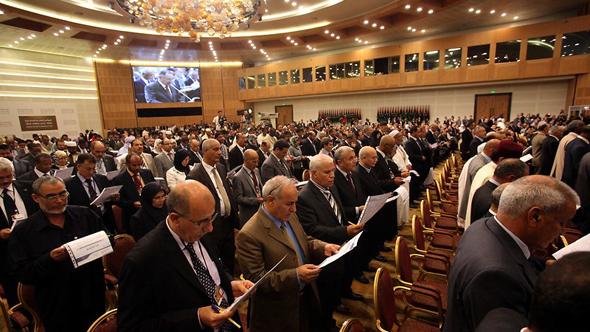
Libyan Politics: Moderation Amid Anti-Democratic Opposition from Islamist Factions
Overview: Libyan politics show choice of moderation, amid strong anti-democratic opposition from Islamist factions
By TK Maloy
TRIPOLI – Pushed along by NATO intervention, the fighting of the Libya civil war largely came to an end in late October 2011 after the capture and assassination of “Brother Leader” Muammar Qaddafi.
With death of the mercurial, long-time leader of Libya; each party to the conflict – the NATO coalition, the various groups of rebels, including tribal fighters, Islamist brigades, and militias attached to various cities – reached the common goal of overthrowing the Qaddafi regime.
The clash of civilizations continues, however, in Libya, with jihadists out for blood not only from Westerners but also in growing attacks against their own country persons who do not share their particular brand of fundamentalists Islam.
However, other than that shared objective, each respective stakeholder in the fighting held very different expectations for the post-war shape of the Libyan nation.
No one has had their expectations manifestly satisfied — but Libya is undergoing a number of rapid changes including last summer’s election of the General National Congress, a body of elected representatives; and the expected drafting and passage of a constitution sometime in 2013. Currently the country operates with a temporary “Constitutional Declaration” (promulgated by the National Transitional Council) under which the country was declared a parliamentary republic.
Thus far, at least in the legislature, the country has not gone the same route as neighboring Egypt, instead has electing a “moderate” – the word being relative – parliament and leadership.
The 2012 parliamentary elections
The 2012 parliamentary elections were on the seventh of July with Libyans voting for the representatives of their choice to the 200-member General National Congress. The GNC is an interim legislative body that replaced the National Transition Council, which was coalition group coordinating the 2011 uprising. In the results a secular alliance beat the Islamist parties in first national polls since 1965.
Political parties with seats in the GNC are: National Forces Alliance Justice, Construction Party, National Front, Union for Homeland, National Centrist Party, Wadi Al-Hayah Party.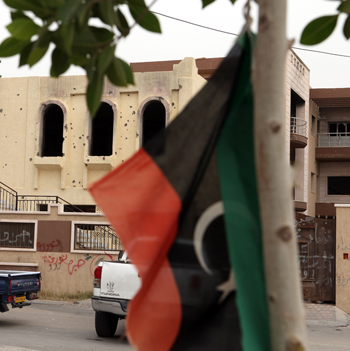
Western observers were surprised by the refutation of Islamist politician, but many Libyans themselves say that in view of the situation in Egypt and after over 40 years of being “preached” by the “Brother Leader” there was little desire to elect a representative assembly that would harp on Islamic theology to a populace that is already thoroughly Muslim, albeit with a spectrum of dogmas.
In a BBC report, one young Libyan woman said the populace does not need politicians to tell them how to be good Muslims.
“It’s not like we expect nightclubs and things like that to suddenly open their doors here,” 18-year-old Heba told the BBC.
“We have things to take care of like education and health,” Heba said.
One analyst noted that “In a society that is already overwhelmingly conservative, the Islamists’ rhetoric failed to offer a fresh policy message.”
Libya is in political flux
Still, however, like most countries who have lost their strong man dictator, Libya is in political flux, with the legislature and leadership still finding their political legs, including trying to form a centralized security force out of the former rebel brigades, amid radical Islamist parties refuting the democratic process altogether, and various armed militias exercising unilateral power under warlord leadership.
In a recent example of militia lawlessness an attack took place in mid-May against the Mellitah Oil and Gas complex near Zwara, about 110 kilometers (70 miles) from Tripoli. The complex that was hit is a joint venture between Libya’s National Oil Corp. and Italian energy company, Eni SpA. It was reported that the militiamen fled the site after seizing weapons and equipment from the guards.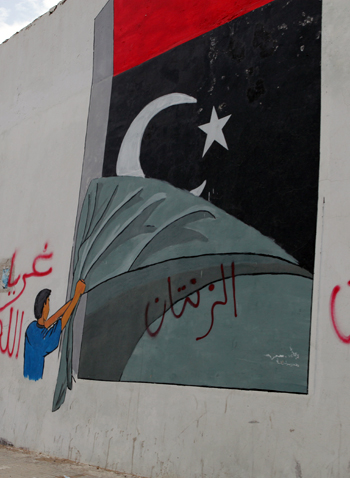
Also during May there has been a string of bombings in both Benghazi and Tripoli. These attacks accelerated after the May 5th passage of a “political isolation” law barring former members of the Qaddafi regime from holding government office.
Prior to this was a bombing of the French embassy in Tripoli, which wounded several persons but resulted in no fatalities.
The starkest political difference between the elected leadership and Islamist opponents was markedly demonstrated by the Sept. 11 attack of the US consulate in Bengazi. Hardcore Islamists militias with links to Al Qaeda, hit the consulate, and a neighboring compound, in a massed assault the killed several Americans including Special Forces defenders and Ambassador J Christopher Stevens.
The aftermath has put US policy toward Libya on notice, that the NATO assisted overthrow was not a total home run politically, and that there are many elements in the country who do not want to see a Western form democracy. Let alone a secular government that doesn’t bear the stamp of Islamist approval along with the implementation of Sharia law.
The clash of civilizations continues
But, both the moderate leadership and the opposition Islamic militants should not come as a surprise, as it follows in line much of the complexity and crosscurrents of the Middle East and North Africa. At issue throughout the region, is the question of ultimate national leadership up for issue in Libya, Tunisia, Egypt and certainly Syria. Of these countries, though amid a degree of chaos and lawlessness, Libya seems the most centrist and relatively stable.
The clash of civilizations continues, however, in Libya, with jihadists out for blood not only from Westerners but also in growing attacks against their own country persons who do not share their particular brand of fundamentalists Islam.
With regards to post-NATO operations follow-up by Washington and Europe, including the often neglected component of après-military planning, Berkeley 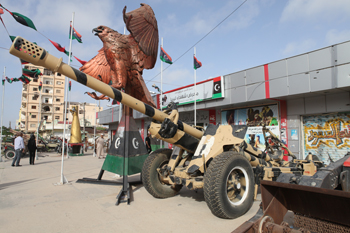 Research Group director Ethan Chorin noted, “For its promise, the Arab Spring seems to have pushed the U.S. into quasi-paralysis — and at the worst possible time.”
Research Group director Ethan Chorin noted, “For its promise, the Arab Spring seems to have pushed the U.S. into quasi-paralysis — and at the worst possible time.”
Chorin chided Washington for its lack of suitable post-rebellion assistance to Libya to ensure operating government services and institutions.
Not directly stemming from the consulate attack, but more so from a general hangover of the relative chaos that plagues Libya, many pundits have suggested a “Libya Complex” is making Washington and NATO cool on any military intervention in Syria.
Ongoing political scene
The GNC elected Ali Zeidan as the new prime minister in October, 2012 —the second PM within a month — after Mustafa Abushagur was dismissed in a vote of no confidence after his choice of ministers prompted protest within the GNC and among activist. Zeidan is a former career diplomat who had defected in the 1980s and was a vocal critic of Qaddafi.
In remarks at a news conference after his election, Zeidan said “The security file will be my top most priority because all the problems that Libya suffers from stems from security issues. The government will be an emergency government to solve the crises that the country is going through.”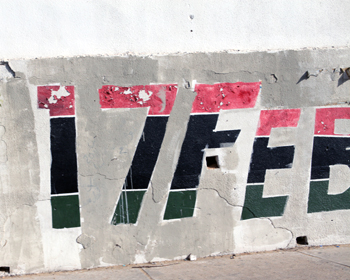
A number of observers of the Libyan polity have noted that there is the potential for balkanization of the country if the political situation becomes more chaotic.
In Geopoliticalmonitor.com, analyst Nicolai Due-Gundersen (who is with the Arab Institute for Security Studies) notes of the security question, and the historical divisions of Libya, the following: “For a sense of where Libyan politics are headed if the country’s present instability continues, one must look to the historical power centers, such as Tripolitania and Cyrenaica, as well as the geopolitical factors of bordering states and resource distribution. Such factors may determine if Libya eventually splits into two politically autonomous territories.”
However, the quick adoption of elected civilian government and the inherent emphasis on civil society vs. tribal allegiances; along with Libya’s oil wealth providing cash flow to the nascent government, gives some reasons for optimism in the long-term.
Economy Minister Mustafa Abufunas said in recent remarks that Libya “wanted to send a message to the world that it is safe and able to build its economy. It will need a huge effort”, he noted, adding, “and it is no great secret that it’s going to take an effort thanks to the legacy of 40 years past.”